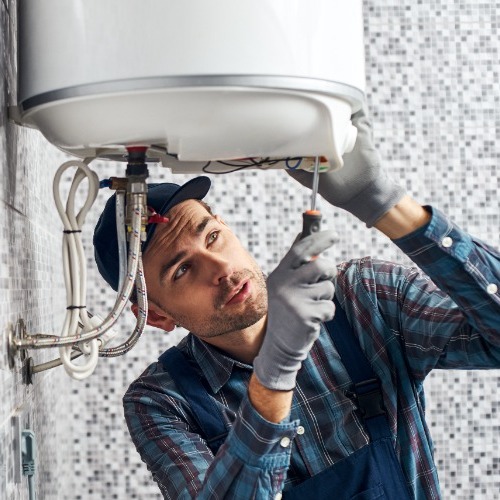
High-Quality Water Heaters
Are you getting the best service from your current gas water heater? Maybe you are, maybe not, but to find out, let’s get an answer to, “How does a gas water heater work?” A gas water heater works on convection, much like your kitchen oven. Convection is based on the physics of how heat rises.
With your convection oven, hot is circulated inside and around the cavity of the oven. This process helps the food to cook faster and with the use of a fan, it cooks more evenly. In regard to a gas water heater, the cold water fills the tank as the water flows through a supply tube with force, maintaining a continuous supply of cold water.
What are the parts of a gas water heater?
When you understand the components of your gas water heater, you’ll be able to troubleshoot problems and understand a technician when they’re explaining what is needed. The components of a gas water heater are:
- The Discharge Pipe, Dip Tube, and Tank: The big cylinder thing of your gas water heater is the tank. The dip tube is inside this tank and extends from the top to the bottom. As the water is heated inside the tank, it rises up inside the tank and is then discharged through a pipe and is dispensed throughout the house to where the hot water is needed.
- The Assembly and Gas Burner: Under your gas water heater is a gas burner, this is what heats the water when the pilot light turns on. On the exterior, to the side is a control module that functions like a thermostat for changing the temperature which ignites the pilot light. The gas line runs along the tank, a shut-off valve is there so that the gas can be shut off quickly in an emergency.
- The Exhaust Flue: Using a gas water heater generates other gases during the combustion process and the exhaust flue vents these gases and performs heat exchanger duties. The exhaust flue is vented from the top of the gas water heater to the outside.
- The PRV and the Drain Valve: The PRV (pressure release valve) is a safety component that releases any extra pressure & temperature if too much pressure builds up inside the tank. The PRV is an important component because any excessive heat or pressure is dangerous. At the bottom of the tank is the drain valve where you can flush sediment that settles at the bottom of the tank.
How efficient is a gas water heater?
There are three basic options for gas hot water heaters:
- Standard gas water heaters: Most of them today have an EF (Efficiency Factor) between .58 and .60. In layman’s terms, this means between 58% and 60% of the energy is heating your water.
- Energy Star gas water heaters: Most rank between .67 and .70 EF. This option has better insulation and an electrical igniter for the pilot light. Some have a flue damper control. With all 3 of these upgrades, your gas water heater is between 7% and 10% more efficient.
- Tankless gas water heaters: This on-demand type of water heater is the latest, state-of-the-art type in water heaters, available in electric-powered or gas-powered options.
How long will a gas water heater last?
If you’re replacing your current gas water heater, you’ll be pleased to know they are manufactured better today. However, to get a maximum lifespan of 15 years, you’ll still need to follow regular maintenance on the unit. This includes a regular schedule with a professional plumber for inspection, draining, and flushing.
Will a gas water heater work without electricity?
A gas water heater will provide you with continuous hot water, even in a power outage, if you have a conventional gas water heater that has a pilot light. If you have a tankless gas water heater, it will need electricity to get the water from the base component to the rest of the house.
Why is my gas water heater not working?
There can be several reasons why your gas water heater isn’t working. For example, your pilot light may have gone out, the pilot light orifice may be clogged or worn out, or the heating element may be burned out.
If you have checked the pilot light and it is working but if you’re still not getting any hot water, or the gas water heater won’t stay lit at the pilot, call a professional plumbing contractor to inspect the unit. After their inspection and testing, the plumber will advise you on what needs to be done to get it working again, or they may let you know it’s time for a new gas water heater.
Is It Time for A New Gas Water Heater?
If the inspection finds that your gas water heater has retired, you should ask your plumber, “What should I look for when buying a gas water heater?”. So, when replacing a gas water heater, here are five things to keep in mind:
- FUEL SOURCE
- ENERGY EFFICIENCY
- WATER STORAGE CAPACITY
- SPACE REQUIRED
If you need a gas water heater in Chattanooga, TN, the team at Chattanooga Water Heater Co. can be there to help. Give us a call at 423-718-7342 to schedule your service.


